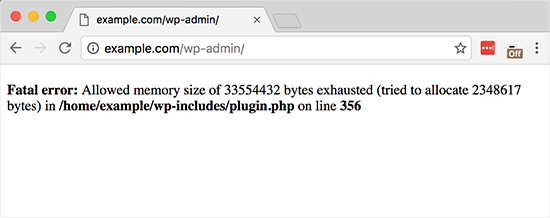Running into the “allowed memory size exhausted” error in WordPress can be frustrating. It’s a common issue that pops up when your site needs more PHP memory than it’s allowed.
This error can slow down your website or even crash it temporarily. That’s why fixing it quickly is important to keep your site running smoothly for visitors.
Luckily, there’s a simple fix to this problem. By increasing the PHP memory limit, you can resolve this error and improve your site’s performance.
In this guide, we’ll walk you through the easy steps to increase the PHP memory limit and get your site back on track.

What Is the WordPress Memory Exhausted Error?
The WordPress memory exhausted error is a message you might see if your website is struggling to perform tasks.
WordPress is built using PHP, a server-side programming language that needs memory to run.
Just like any other computer, web servers have a limited amount of memory to run multiple applications at the same time. WordPress hosting providers allocate specific memory sizes to different applications, including PHP.
When your WordPress code requires more memory than the default allocated memory, you will see this error message:
Fatal error: Allowed memory size of 33554432 bytes exhausted (tried to allocate 2348617 bytes) in /home4/xxx/public_html/wp-includes/plugin.php on line xxx

Your WordPress site may be exhausting its server memory if it has:
- A lot of images, videos, and other types of media
- Plenty of unused WordPress plugins
- Outgrown its hosting plan resources
By default, WordPress automatically tries to increase the PHP memory limit if it is less than 64MB. However, 64MB is often not high enough.
In the next section, we’ll show you how to easily increase the PHP memory limit in WordPress to avoid the memory exhausted error. You can use the quick links below to navigate through the tutorial:
Note: Some of these methods require you to directly edit your WordPress files. We suggest backing up your website first to avoid further errors from appearing on your website.
Ready? Let’s jump right in!
Option 1: Editing the wp-config.php File
First, you need to edit the wp-config.php file on your WordPress site. This is one of the core WordPress files located in the root directory, usually named public_html.
You will need to use an FTP client like FileZilla or file manager in your web hosting control panel.
Next, you need to paste the following line in the wp-config.php file just before the one that says, That's all, stop editing! Happy blogging.
define( 'WP_MEMORY_LIMIT', '256M' );
This code tells WordPress to increase the PHP memory limit to 256MB.
For more details, you can see our step-by-step guide on how to find and edit the wp-config.php file.
Once you are done, you need to save your changes and upload your wp-config.php file back to your server.
You can now visit your WordPress site, and the memory exhausted error should have disappeared.
Option 2: Editing the .htaccess File
The next method is to edit the .htaccess file. This file is also located in the WordPress website’s root folder.
Here, you need to paste the following code before the line that says #END WORDPRESS.
php_value memory_limit 256M
Similar to the previous code, it will tell WordPress to increase the PHP memory limit to 256MB.
After that, simply save your changes and upload the file back to your web server. You can now open your WordPress website again to see if the memory limit error has gone.
If you can’t find the .htaccess file, you can check out our guide on why the .htaccess file may be missing and how to find it.
Option 3: Checking Your php.ini File
If the above methods don’t work, you may want to look at your php.ini file.
php.ini is a file that controls your PHP settings, including the PHP version and PHP scripts. It’s not a WordPress core file, as your hosting provider usually manages it.
You can check its code to see your PHP memory usage limit. For more details, you can see our guide on how to find and edit the php.ini file.
However, because this is an advanced method, we recommend contacting your web hosting provider’s support team instead to see if they can increase the WordPress memory limit manually. Otherwise, this can result in further errors.
You can read our guide on how to properly ask for WordPress support for more information.
Tired of dealing with WordPress errors? Then, you can leave the stress behind and let our expert team provide fast and reliable emergency support. With our on-demand service, you get quick fixes without the hassle of ongoing contracts. Call our Emergency WordPress Support team now!
Option 4: Upgrading Your WordPress Hosting
If you constantly encounter the memory exhausted error, it might be a sign that your website has outgrown its current hosting plan.
As your website attracts more visitors and adds more content, it requires more resources to function smoothly. Upgrading a plan with a higher memory allocation can be a permanent solution.
Consider upgrading your WordPress hosting if:
- You’ve tried the previous solutions, but the error persists.
- Your website has significantly grown in traffic or content.
- You plan to add features or functionality that require more resources.
Bluehost offers affordable and reliable WordPress hosting plans that can scale with your website’s needs. They provide a user-friendly platform specifically optimized for WordPress, making it easy to manage your website.
If you use our Bluehost coupon code, then you can get up to 61% off your first purchase. Just click the button below to get it:

How to Avoid Exhausting Your WordPress Memory
Now that you’ve fixed the WordPress memory exhausted error, here are some proactive steps to prevent it from happening again:
- Deactivate unused plugins. Many plugins contribute to memory usage. Regularly review your installed plugins and deactivate any you’re not actively using to free up memory for essential tasks.
- Optimize images. Large images can be memory hogs. Consider using a plugin like EWWW Image Optimizer to automatically compress images before uploading them to your site.
- Use a caching plugin. Caching plugins store website data, reducing the need for WordPress to regenerate it on every visit. This can significantly improve website performance and lower memory usage.
We hope this article helped you solve the WordPress memory exhausted error by increasing the PHP memory limit. You may also want to see our step-by-step beginner’s guide to troubleshooting WordPress errors and our expert list of the most common Wordpress errors.
If you liked this article, then please subscribe to our YouTube Channel for WordPress video tutorials. You can also find us on Twitter and Facebook.





mohadese esmaeeli
With your permission, I’d like to add a note for users to the article:
Please note that htaccess is a hidden file. First, check if it exists. In case you couldn’t find the .htaccess file in your hosting, you can create one using text editor programs like Notepad. Simply create a file named htaccess. Alternatively, in the public_html directory, click on “New File” and create a file with the same name.
mohadese esmaeeli
I have encountered this issue multiple times, and it seems to be one of the most common problems in the WordPress domain. Each time, I either contacted the hosting support or edited the htaccess file to resolve the issue. The htaccess file appears to be like a magic solution, and whenever an issue arises, it can be quickly reviewed and fixed.
Mrteesurez
I used to encounter some errors like this on my websites but I didn’t know what to do. Something when I tried to solve it, I just uninstall the step and re-install it back and upload the backup.
I noticed the problems still persist, when I enable wp debug mode, t then see the exact errors and the it’s source.
I later find this guide and implented it and it works.
Thanks.
WPBeginner Support
Glad to hear our guide was helpful!
Admin
karma tsheten
AFter updating my .htaccess it gives me this error:
Internal Server Error
The server encountered an internal error or misconfiguration and was unable to complete your request.
WPBeginner Support
To be safe, for the internal server error we would recommend going through the steps in our article below:
https://www.wpbeginner.com/wp-tutorials/how-to-fix-the-internal-server-error-in-wordpress/
If removing the code from the htaccess solves the issue, we would recommend reaching out to your host to see if they have a setting that could be the source of the conflict.
Admin
Jiří Vaněk
Regarding the .htaccess file, be cautious. Many shared web hosting providers may have directives for increasing the memory limit disabled. Such a directive in the .htaccess file can cause a 500 error on the website, requiring its removal or commenting out. Be careful with this. Sometimes, simply increasing the memory limit may not solve the problem but rather delay it, like a painkiller. The pain might subside, but it doesn’t mean the cause has been resolved. Therefore, while increasing the memory limit might seem like a solution, it’s also important to check what is consuming the memory. Sometimes, people increase the memory limit from 512 MB to 1024 MB without considering whether it’s necessary, and whether the memory limit isn’t masking an underlying issue on the website.
WPBeginner Support
Thank you for sharing your feedback on the htaccess change. Unless the host has very strict rules in place adding to the htaccess shouldn’t cause an error it is more likely to not work and would require you reach out to the host to request an override.
Admin
Jiří Vaněk
In the Czech Republic, practically 90% of web hosting providers prohibit manipulating PHP limits. The simple reason for this is that it’s a source of revenue for them. The limits are usually fixed, and if you want a higher limit, you have to switch to a more expensive plan. Therefore, after reading many of your posts, I also started considering foreign web hosting providers for new websites, such as HostGator or DigitalOcean. Abroad, such issues with limits typically don’t exist as they do here.
ROOK
SAVED THE DAY!! TY
WPBeginner Support
Glad our guide could help!
Admin
Qamar Shafique
Thanks for this help.
WPBeginner Support
You’re welcome!
Admin
Aisha
It doesn’t solve my problem still shows an error after placing the code “define( ‘WP_MEMORY_LIMIT’, ‘256M’ );” and I also change the size of Memory_limit of Php.ini file
WPBeginner Support
As we state in the article, if our code does not work, there is a good chance your hosting provider is overriding the memory limit and you would need to reach out to your host to fix the error.
Admin
Sohaib Siddiq
It doesn’t solve my problem still shows an error after placing the code “define( ‘WP_MEMORY_LIMIT’, ‘256M’ );” & this is my front-end page showing
Fatal error: Allowed memory size of 67108864 bytes exhausted (tried to allocate 8192 bytes) in /home/X/wp-includes/class-wp-dependencies.php on line 260
WPBeginner Support
If the code does not work for you, we recommend reaching out to your hosting provider as they may have a limit set on their end that could be the root of the issue.
Admin
Zachary Murri
Thank you so much <3
WPBeginner Support
You’re welcome
Admin
Bogosi
Thank you for this!
WPBeginner Support
You’re welcome!
Admin